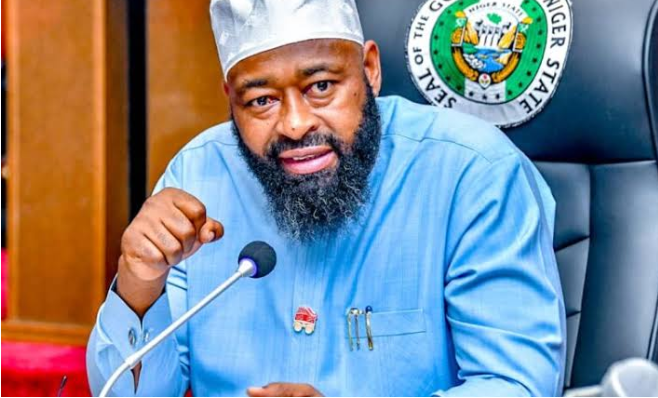
Shockwaves in Niger: Governor Bago Orders Preachers to Submit Sermons for Approval Before Speaking

The political and religious landscape of Nigeria was thrown into heated debate yesterday after Niger State Governor, Umar Bago, made it clear that preachers in the state would now be required to submit their sermons for approval before addressing their congregations. The announcement, which was further clarified during his appearance on TVC’s Politics on Sunday, has left many Nigerians divided, with reactions pouring in from different quarters about whether this move represents a necessary step towards security and peace or a direct attack on religious freedom and democracy. Governor Bago, who has been making headlines recently for his bold statements and firm approach to governance, insisted that the measure is not a ban on evangelism but a regulatory framework designed to maintain order, prevent incitement, and protect citizens from potentially harmful or divisive messages. According to him, it is normal practice in some countries, citing Saudi Arabia as an example where such vetting of sermons is part of the law. “I didn’t ban evangelism,” he said firmly. “For everyone going to sermon on Friday, he should bring his scriptures for review, and it’s normal. Even in Saudi Arabia, this is done. We cannot say because you have been given the opportunity to be a cleric, you will go out and preach the gospel that is anti-people, anti-government and you think it’s normal.” He further added that the initiative is aimed at curbing indoctrination and dangerous preaching that could destabilize the peace in the state. “It’s in that direction,” Bago explained when asked whether the move was connected to fears of indoctrination. “We want to be able to see what they are preaching, hear what they are saying. We are working together with security agencies; the Department of State Services (DSS), the Police, Nigeria Security and Civil Defence Corps (NSCDC) and the military.” His comments echoed earlier statements by the Director General of Niger State Religious Affairs, Umar Farooq, who had publicly announced the introduction of licences for preachers. Farooq revealed that preachers in Niger State now had two months to obtain licences if they wished to continue their activities. “It is true, the State Government has banned preaching. Any preacher who wants to preach must secure a licence between now and the next two months. All they need to do is to visit our office, get, and fill out the form. After which, they will have to face a panel that will screen them before they can start preaching.” The directive, which has been described by some as controversial, has sparked outrage among certain religious bodies, with leaders insisting that they were neither informed nor carried along. Raphael Opawoye, secretary of the Christian Association of Nigeria (CAN) in Niger State, said the Christian body had no knowledge of the ban. “The Christian Association of Nigeria is not aware of the ban. We shall come up with a statement when we are officially informed,” he told reporters. On the other hand, Islamic scholar Uthman Siraja did not mince words in condemning the policy, describing it as an outright infringement on freedom of religion and worship. “The ban on preaching is an infringement of freedom of worship and religion. The best thing for the government to do is to invite and penalise any preacher who incites the public in the cause of his preaching,” he argued, adding that the government’s sweeping regulation threatens the rights of peaceful preachers who have never promoted hate or violence. The announcement has since ignited a storm of public opinion across social media, with critics and supporters of the policy clashing over its implications. Some Nigerians argued that the governor has crossed the line, accusing him of attempting to dictate religious practices in a secular nation that constitutionally guarantees freedom of worship. Others, however, praised him for taking what they see as a bold and proactive stance to curb extremist ideologies that may be disguised under the cloak of religion. Comments on popular blogs and online forums reflected this sharp divide. “Demons…no such law shall stand. The gates of hell shall never prevail,” one furious commenter wrote. Another took an apocalyptic stance, claiming, “Anti-christ agenda, even with tax law that is carrying the number and mark of the beast by FG. Rapture is at hand, repent and accept Jesus Christ now.” Yet, there were also voices of support hailing the governor’s move. “This is the best action taken by this Governor. I never knew a Fulani Man will come up with this great regulation to stop all the unnecessary hate being preached in the name of God. I am in full support and would want it to extend to those merchant pastors claiming to be performing miracle and hearing from themselves rather than God. Deceiving people and destroying families,” one commenter said passionately. Another wrote, “God bless you the people’s Governor. Na leader you be ooooo.” For others, however, the move was nothing short of misplaced priority. “Another misplaced priority! Nigerian leaders only choose what benefits the government from other countries but ignore whatever makes life better for the citizens,” one Nigerian lamented, while another dismissed the decision outright as “nonsense and cowardly.” Observers say the directive will likely test the fragile balance between religion and politics in Nigeria, where both Christianity and Islam play pivotal roles in public life and where issues of faith often stir deep emotions and tensions. The controversy also raises questions about how much power state governments can wield in regulating religious activities without infringing on constitutional rights. Legal experts have begun weighing in, suggesting that if challenged in court, the policy may face serious hurdles since Section 38 of the Nigerian Constitution guarantees freedom of thought, conscience, and religion, including the right to manifest and propagate one’s faith. Already, human rights activists are preparing to challenge the directive, arguing that it sets a dangerous precedent for government interference in religious affairs. As the debate rages, Niger State has become the center of national attention, with many waiting to see how religious organizations, civil rights groups, and legal institutions will respond. Will the measure survive the storm of criticism and be implemented fully, or will it collapse under the weight of public resistance and constitutional constraints? Governor Bago appears determined to press forward, standing firm in his belief that the regulation is necessary to maintain peace and security. Yet, the public reaction shows that this is more than just a policy matter; it is a direct confrontation with deeply held beliefs about religion, freedom, and the role of government in Nigerian society. For now, preachers in Niger State face a ticking clock, with just two months to secure licences and submit their sermons for vetting if they wish to continue preaching legally. Whether this becomes the beginning of a new era of government-regulated religion in Nigeria or a short-lived experiment destined to fail remains to be seen. But one thing is certain: the people are watching, and the nation is talking.


